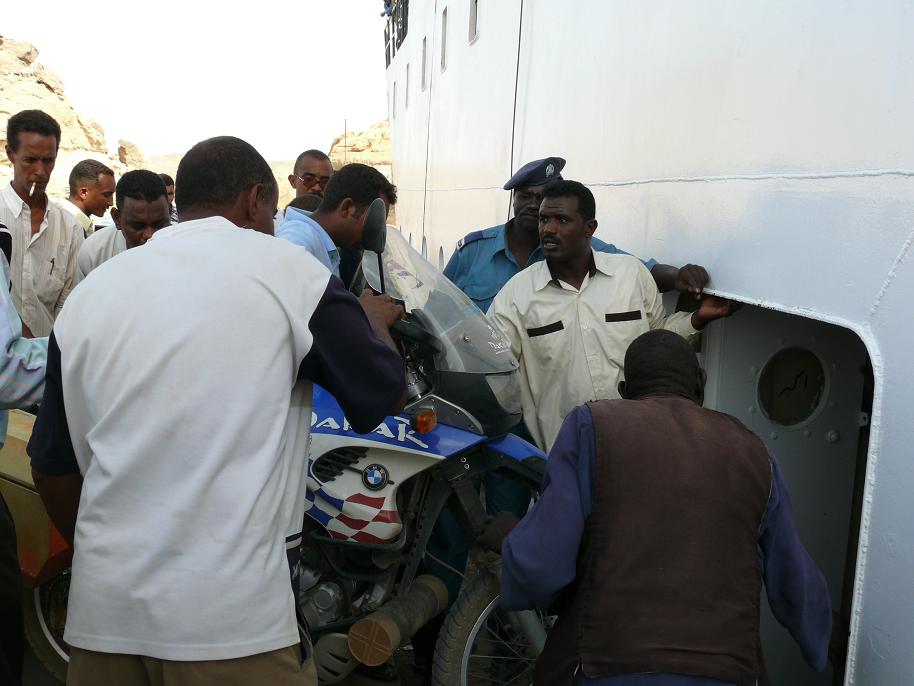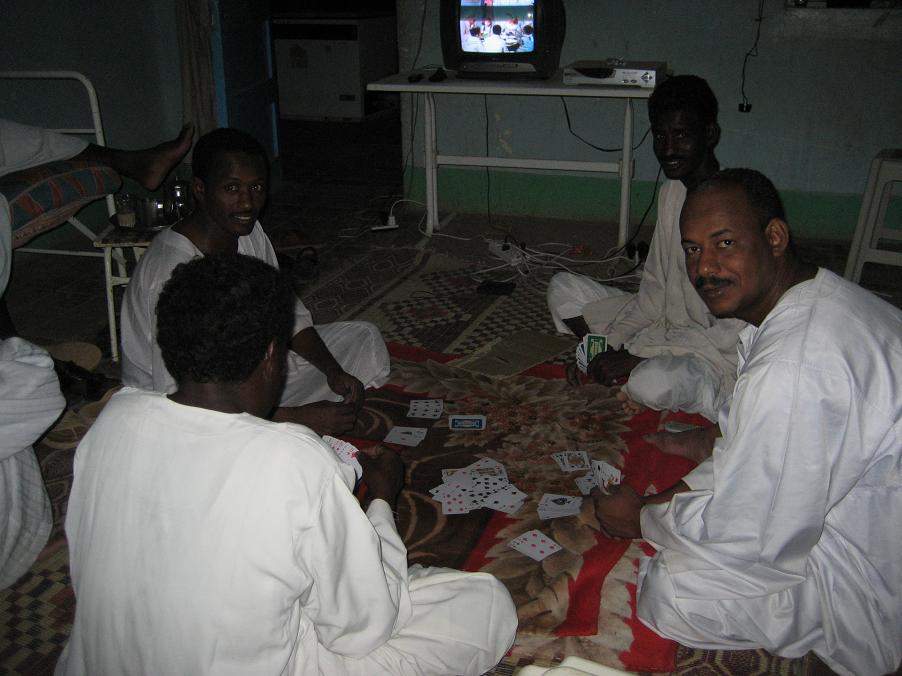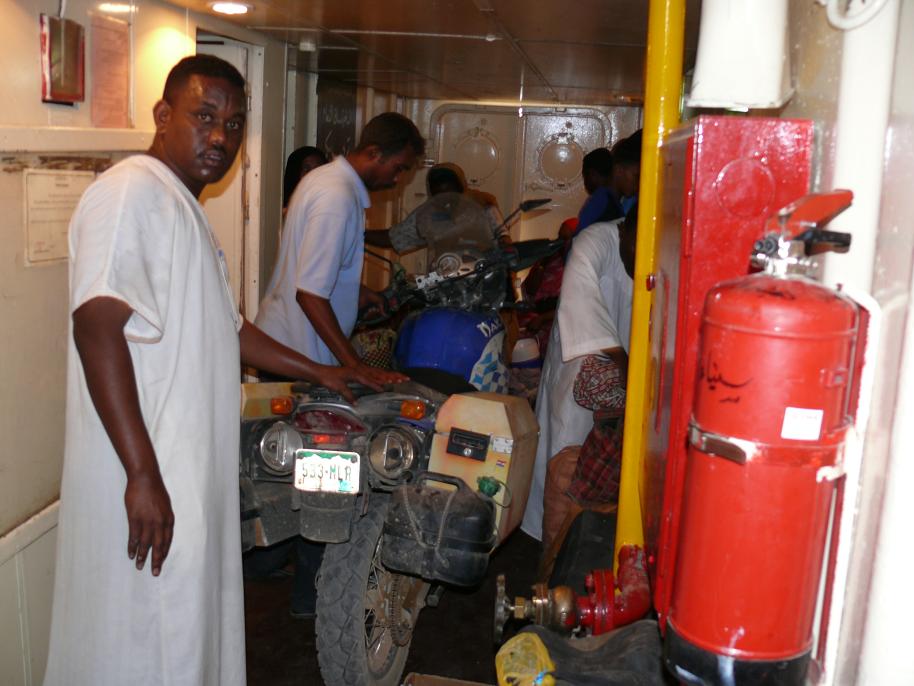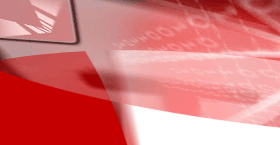|

Loading the bike at Wadi Halfa, Sudan.
May 16, 2007. This report on the Sudan comes from aboard the Wadi Halfa-Aswan ferry. The ship is gliding along at a good clip on the smooth waters of Lake Nasser. My bike is resting below decks, tired and damaged from the 12,000+ miles we've ridden through Africa. In Germany I'll have the bike repaired before setting out to cross the vast expanse of Russia with my friend, Oli Fischer.
Sudan is a remarkable place- in more ways than one. The people here are indeed among the finest on the planet. Kindness and generosity are simply a way of life here.
Two weeks ago today I rode from the cool highland town of Gonder (in Ethiopia) down to the burning hot flatlands of southern Sudan. It took over 4 hours to complete the crossing from Ethiopia into Sudan. On the Ethiopian side there was no one available to stamp my carnet with an exit stamp. On the Sudanese side there was no one available to stamp my passport with an entry stamp. The Sudanese were apologetic. As I sat there waiting a great deal of food was brought to a table in the office. I watched as the men washed their right hands in preparation for supper. After some time a man waved me towards the food, beckoning me to start eating. Before long a second, third, fourth and fifth did the same. Steadily they insisted more urgently as I continued to decline. I finally realised that these men had no intention of eating unless I joined them. I've crossed many borders on this trip, but this was a first- border agents concerned about my welfare. This was only the beginning. In the coming weeks I would be wowed again and again by the way these people looked after me.
The 2 days I spent riding from Gallabat to Khartoum were painful thanks to the burning Sudanese sun. The temperature was above 115F both days. At the end of each day I felt sick to my stomach, had a headache and was very dehydrated. I was concerned about heading further north into the desert.
Reaching Khartoum was a relief. The city has a population of over 10,000,000 though one would never guess it by the looks of the place. I had been communicating with another Horizons Unlimited member for several months when I arrived in Khartoum, he heading south and I north. We finally met up at the Blue Nile Sailing Club in downtown Khartoum. Rich and his girlfriend Sasha are riding a 1955 Enfield from Europe to Capetown. It's a classic old bike! Rich has no idea how many miles the bike has on it. The bike looks tired but it seems to be rocking steady. Stupid me didn't get a picture of them with the bike (Rich- send me one?!). The hotel I stayed at in Khartoum had a great Indian restaurant on the property. Rich and Sasha had both spent time in India and therefore understood the menu that contained more than 100 items. One night Rich and Sascha came over with Jason (a German rider travelling with them on a bike like mine) and ordered a load of vegetarian dishes- it was the most exciting food I had during my stay in Sudan, just incredible. Thanks guys- and Kampala will only be better!
The day after Rich/Sascha/Jason left felt very empty. It was fun to do things with other riders and I regretted they weren't heading north. As luck would have it, I was also in touch with a terrific fellow from Slovenia named Dane (pronounced Danny). Dane had arranged to have a new front tire flown into Khartoum from Europe for me. Dane had returned to Europe a month before I arrived in Sudan- this was because I arrived in Sudan some 2 months behind schedule! By some miracle Dane was sent back to Khartoum for a month and I was able to meet him and procure the tire. Dane was busy with work when we met so he entrusted me to his Sudanese friend, Maghdi. Maghdi spent the morning with me, taking me to a bank, getting the tire fitted, taking me to lunch, etc. When it came time to pay for lunch I removed my wallet and asked what I owed. Maghdi leaned over the table and furled his eyebrows in a mixture of curiosity and anger and said, "are you CRAZY?" I was his guest and that was that. Welcome to Sudan- this is how it is here. Stuck on the side of the road, not a problem. Tired of riding- it's late and there are no hotels within a hundred miles? "Please, come with me" someone will say. What- you're hungry but there isn't anywhere to get food in a tiny, remote village? Don't be stupid, in Sudan, you're covered. This hospitality is not to be abused of course. But when times are hard and you're in trouble, these amazing people won't turn their backs on you. Nowhere was this hospitality more evident than on the road from Khartoum to Wadi Halfa.
Talking with the other southbound riders, I was warned about the terrible roads and even higher temps to the north. When a smug Brit heard I was heading north on the road they had just come down, he very sarcastically said to me, "good luck." At this stage in the game I don't rely on luck. This fellow was only half way through his second country in Africa and seemed to think I had been transported to Sudan by spacecraft. He even went on to tell me what a non-event the attacks on 9-11 were, knowing full well I was a pilot for a company directly affected by the attacks! It was nice to know we were headed in opposite directions.
I knew from the beating I took in the heat from Gallabat to Khartoum that I would have to adopt to the conditions to make it to Wadi Halfa without being punished. A word of advice to riders heading this way in the warmer months: the quicker you can learn how the Nubians do it, the better off you'll be. People in northern Sudan don't pack up their camels and head to Scandinavia for the summer- they cope with the heat and do just fine. When faced with 120F type riding days, learn to adopt: 1) Start riding by 0530-0600. 2) Stop riding at 1130-1200. There are some shady places to rest along the way. They may look scary at first- most have old rope beds or straw mats to lay on. Some have old carpets. The carpets aren't as cool to lay on and are often dirty. Rope beds are the best as they are the cleanest and afford more air circulation. Kick off your boots before stepping on the mats or climbing into a rope bed. 3) Drink things other than water- the Nubians do! You won't see desert dwellers swilling off huge bottles of mineral water. Drink 1 or 2 sodas per day. Drink 1 or 2 cups of sugar laced coffee per day. Eat what the Nubians eat, drink what they drink, rest when they rest- pay close attention to what they are doing and learn from them. They've been at this for centuries, longer in fact! 4) It's safe to mount up and start riding after 1500, though I waited until 1600. I usually slept from around 1 until 3, often longer.
The Nubians run a "spilt sleep" schedule so to speak. I picked it up in 1 or 2 days thanks to the heat. It's best to wake up at 0500-0530. Get on the road before the sun comes up and you'll get some nice sunrise pics along the way. Rest after 1100 and catch up on your sleep while the sun does it's worst as you snooze in the shade. The villages don't really get going until 2100 and close down between midnight and 0100. This is due to the heat of course. Eating a big bowl of ful at 2300 always knocked me out by midnight. Ful had the same drowsy effect for my noon nap.
Despite the warnings of rough roads to the north, I found them to be fine. There were a few sandy/rough areas but these were short in duration. The bad sections of road constituted less than 5% of the ride from Khartoum to Wadi Halfa. The entire road is improved (maintained) and a highway is being built from Abu Dom to Wadi Halfa. It should be completed within a year or two. The road from Kartoum to Abu Dom is paved and in great shape.
I rode from Khartoum to the village of Dongola in one day. The ride from Dongola to Wadi Halfa takes 2 to 3 days. Thanks to a late start in Dongola I spent an extra night in Delgo. Why the late start in Dongola you ask? Let me explain. I was told the first ferry from Dongola to the east bank of the Nile departed at 0600. When I arrived on the west bank of the Nile at 0545, I knew something was wrong. There were no people near the launch point. There was only one man in the souq (market) building a fire to make tea/coffee. I sat in the dirt, resting against the side of my heavily loaded bike and waited for signs of life- and the brutal sun. Minutes turned into hours. Ever so slowly night began to turn into day. My enemy the sun was on its way. I watched helplessly as it climbed inexorably into the sky. The day before, a sandstorm had engulfed Dongola and cut visibility to less than 50-100 yards for the entire day. On this day there was a haze of leftover dust that delayed the arrival of the suns intense heat. At 0800 I watched the ferry depart the east bank. I went to the just-opened ticket office to purchase a ticket. I was then informed I needed a note from the local police to make the crossing. I couldn't believe it. So I missed the ferry and set out looking for the police station. It was after 0900 when I returned and caught the ferry- by now the sun had really warmed things up. I considered spending another night in Dongola and making an early start the next day. The thought, however, of another sandstorm sweeping across the desert made me decide to ride while the winds were calm and the skies blue. I'm glad I did.
I knew the village of Delgo had no hotel or lokanda (community sleeping). I rolled into the place knowing I would be staying there- I just didn't know where. First things first: I fuelled the bike from plastic jugs at the village souq and took a coffee with the boys. I explained that I was hungry and they told me where to find the only restaurant that was open. I went there and was immediately welcomed by 8 or 9 very friendly men playing cards. They served me a delicious beef stew with fresh bread. I asked if there was a lokanda in Delgo. A man (Mehmet) said there was and asked me to follow him. I slowly rode behind him as he greeted people- obviously very curious as to who I was and why we were together. I dismounted outside what looked like a home. He invited me inside and introduced me to 6 or 7 fellows playing cards. There were 3 beds in the room and a large mat upon which the men sat. Everyone knew I was tired and they helped me get my gear into the room. I asked Mehmet if this was a lokanda. He laughed and said: "no lokanda, my home. Welcome!" The boys were watching Arabic TV but quickly turned on the Action Channel so that I could watch something in English. They explained that the Action Channel was transmitted to the Middle East for US military personnel. I settled into Mehmet's home nicely, napping for a while before supper.

Mehmet (right) and the guys play cards while I rest. Delgo, Sudan.
By 2300 I was sound asleep. That night I felt someone tapping on my left shoulder. "DAY-veed, DAY-veed" I heard someone saying. I woke up, wondering if something was wrong. I checked my watch which read 0130. "What is it?" I asked. "Come with us" was the reply. I followed 2 of the men outside while another grabbed my bed and followed us out. My bed was placed among 3 or 4 others in the grass outside the home. The men explained they thought it might be too warm inside the house which was built of sun-baked mud bricks- which do tend to retain the heat. There were dogs barking in the village so I put in my earplugs. My bed was quickly made and I soon found myself under the covers and looking up at the crystal clear Sudanese sky. Even in my mountain climbing days I can't remember seeing more stars. It was trully spectacular. After star-gazing for a while I sat up and looked around at these fellows who had taken me in and showed me such hospitality. As I stared into the shimmering sky it occured to me my time on this continent would soon be at an end. This didn't bring me any joy. I felt more sorrow than anything else. These feelings would haunt me in the coming days. Africa has touched me in a way no other continent has. If my life allows it, I will return to Africa some day.
After 6 days on (and off!) the road I reached the garden spot of Wadi Halfa. This forlorn place is either one's last stop in Sudan, or one's first. The original Wadi Halfa was said to be a beautiful place, but alas it sank beneath the rising waters of Lake Nasser thanks to the construction of the damns at Aswan. The new Wadi Halfa was obviously built on the cheap. There are only 4 hotels in town and they are carbon copies of each other. My room had 3 single "beds" in it. There was no floor, only sand. There was a light bulb hanging from the ceiling, which was full of large holes- this doesn't matter though, as I slept outside. Only tourists would sleep inside a room without aircon or a ceiling fan here in the desert in summer! There was a door which had no lock- or even a doorknob. The showers and toilets were outside. I went 3 days without a shower thanks to the poor plumbing. The toilets were the squatting type and smelled horrible thanks to the lack of running water. None of these things really bothered me as I knew there were nice hotels waiting for me in Aswan. I kept my mind focused on this fact and tried to actually relish the squalid conditions I found myself in, knowing the reward would be appreciated all the more.
The 20 hour ferry ride from Wadi Halfa was actually enjoyable after my time in Wadi Halfa. I shared an air conditioned cabin with an Egyptian fellow who spoke no English. He helped with my Arabic. En route to Aswan we passed the ruins at Abu Simbel, the monument to Ramses II. It was beautiful and well lit at night. It was the first ruin I saw in Egypt, though we were still on board the ship. Disembarking in Aswan took over 4 hours and was a real pain. Around 1400 on 17 May, 2007- with the ka-chunk of an official stamp, I entered Egypt. I'm sorry to say my bike didn't...

The bike below decks. Wadi Halfa-Aswan ferry. Sudan.
|
